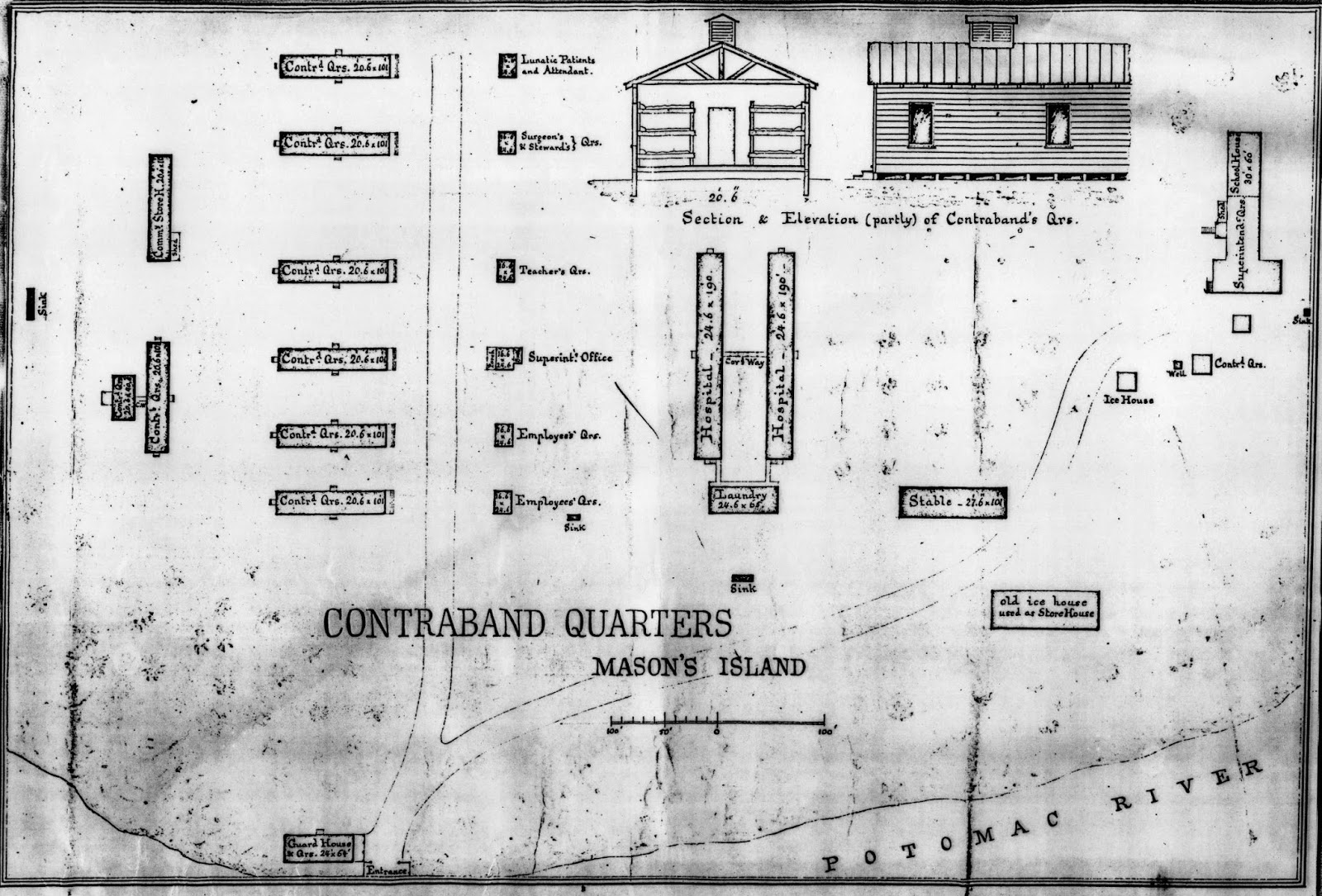An important part of the Friends' charitable activities centered on education. Since starting work in Northern Virginia earlier in the year, the association had sent teachers to Camp Rucker in Falls Church, Camp Wadsworth in Langley, and Mason's Island. In August 1864, the Friends decided to increase the number of teachers to meet the growing needs of the contraband community. Mary McLain was dispatched to Camp Wadsworth, while Margaret Preston was installed at Mason's Island. [1]
 |
| Map of contraband quarters at Mason's Island (courtesy of TR Center). Hospital buildings are shown in the center of the drawing. |
The Friends also provided the contraband camps with clothing, sewing supplies, dry goods, and other household items. At least some of these donations were sold to the freedmen and women, presumably at a discount. [2] In September 1864, the Friends' Association decided to disband its Committee on Supplies and established a new Sanitary Committee. The Board appropriated $500 to the committee for the purchase of hospital supplies for Mason's Island. That month, the committee issued the call for donations in the Friends' Intelligencer:
The undersigned, a sanitary committee of said Association, solicit from Friends and others, contributions of hospital stores, which will be judiciously distributed by nurses and teachers sent out by the Association to Mason’s Island, Camp Wadsworth, and other points in the vicinity of Washington.
The articles most needed, are dried fruits,such as apples, peaches, cherries, plums, and blackberries; also blackberry and other syrups, and all other articles suitable for the sick and convalescent.
Contributions of bed-covering, and clothing for women and children, will be very acceptable, as they are greatly needed. Free transportation has been granted by Government from Philadelphia. (456.)
At the same time the Friends were intensifying their involvement with the camps, Capt. Joseph Brown, an assistant quartermaster, took over primary responsibility for the contrabands in the Department of Washington from the outgoing Chief Quartermaster, Lt. Col. Elias Greene. Brown pursued decidedly stricter policies than Greene, who had lost his job as the result of an Army report critical of his management of the contraband camps. Brown, the head of the Department's Bureau of Freedmen and Government Farms, wanted to rid the government of the expense and trouble of caring for the freedmen and women in the camps and tried to send as many to the Northern States as possible. He also departed from Greene's policy of keeping families together. Brown thought nothing of apprenticing children to local households and hiring out their parents on separate jobs.
Toward the end of September the Friends' Sanitary Committee sent Louisa J. Roberts and Margaret A. Griscom to Mason's Island. Roberts wanted to meet with the new Chief Quartermaster of the Department of Washington, Col. John Ellison, to explain "the wants of our teachers and the people among whom they labor." (First Annual Rpt. 10.) Following her conversations with Ellison, Roberts reported that "[o]ur teachers appear to have his entire confidence, and he seems willing to do all that lies in his power, to promote their comfort and efficiency." (First Annual Rpt. 10.) As to Mason's Island, the visitors found:
The condition of the people. . . is much improved; the great mortality that prevailed during the latter part of the summer, has given place to a more healthy condition, attributable to the success that has attended our efforts to provide hospital accommodations, and to the approach of colder weather. (First Annual Rpt. 11.)Nonetheless, Roberts and Griscom saw indications of troubles yet to come. As the Friends' Education Committee reported in October, "many grievances were found to exist at Camp Wadsworth, and it was believed that through their representations to the proper authorities most of these would be redressed." (Friends' Intelligencer 521.) The Friends were betting on the willingness of the new military leadership to assist, but Brown's policies were fast becoming a part of the problem.
Up Next
Camp Wadsworth suffers a setback.
Notes
[1] Preston was also charged with nursing responsibilities, as the circumstances required.
[2] According to the Friends' Association's First Annual Report:
The people on the two farms composing [Camp Wadsworth] evince a desire to support themselves, and they have paid for a considerable portion of the clothing distributed among them. (10.)Sources
Ira Berlin et al., Freedom: A Documentary History of Emancipation, 1861-1867, Selected from the Holdings of the National Archives of the United States, Series I, Volume II, The Wartime Genesis of Free Labor: The Upper South (1993); Board of Managers, Friends' Assn. for the Aid and Elevation of the Freedmen, First Annual Report of the Board of Managers of the Friends' Assn. for the Aid and Elevation of the Freedmen (1865); Friends' Intelligencer: A Religious and Family Journal, Vol. XXI (1865).
No comments:
Post a Comment